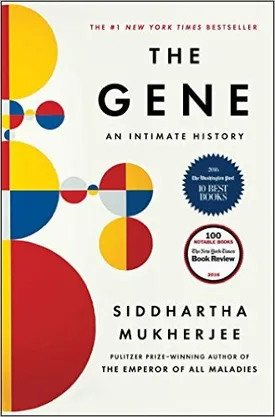Siddhartha Mukherjee
Siddhartha Mukherjee is an Indian-American physician, scientist, and author whose work explores the history, science and ethics of cancer, gene editing and other medical advancements. He is best known for his Pulitzer Prize-winning book, The Emperor of All Maladies: A Biography of Cancer, which was adapted into a PBS documentary series of the same name. He is also the author of The Laws of Medicine, a 2016 book describing the science and ethics of medical practice.
Mukherjee was born in New Delhi, India in 1970, and grew up in the suburbs of New York City. He studied biology at Stanford University, and went on to earn an MD degree from Harvard Medical School in 2000. Following a residency in Internal Medicine at Massachusetts General Hospital and fellowships in Medical Oncology at Dana Farber Cancer Institute he pursued a career as a physician-scientist.
Mukherjee's career as an author began in 2010, with the publication of his first book, The Emperor of All Maladies: A Biography of Cancer. In it, he takes a comprehensive look at the history of cancer from antiquity to present day and delves into the progress of cutting-edge treatments and the potential for a cure. The book won the Pulitzer Prize for General Non-Fiction for 2011 and was adapted into a five-part documentary series for PBS directed by Barak Goodman.
In 2016, Mukherjee published a book on the science of medicine, The Laws of Medicine. In it, he argues that the practice of medicine should be guided by laws derived from recent advances in biological and medical science. He also explores the ethical implications of modern medical practice and the need to balance them with sound clinical judgment.
In addition to his writing, Mukherjee is an active researcher. From 2006 to 2012 he was an investigator at the Howard Hughes Medical Institute, where his work focused on developing therapies for drug-resistant leukemia. He has also contributed to the development of prognostic tests for cancer and studies of transcriptional regulation in cancer cells.
Mukherjee is also a professor of Medicine at Columbia University Irving Medical Center, and serves on the editorial boards of The New Republic, The New York Times and The New England Journal of Medicine. He contributes regularly to Quartz, the Wall Street Journal and other major publications.
Mukherjee incorporates his personal experience as a physician, scientist and patient into his writing and research, which makes it both accessible and engaging for readers. As a result, his work has served to educate and illuminate for a new generation about the history, science and implications of medical developments. This comprehensive and clear-eyed approach to the exploration of science and ethics has made Siddhartha Mukherjee's work an important and valuable contribution to the world of medicine.

